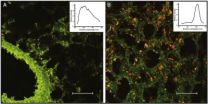(Press-News.org) PITTSBURGH, Nov. 1 – Nonsteroidal anti-inflammatory drugs (NSAIDs) prevent colon cancer by triggering diseased stem cells to self-destruct, according to researchers at the University of Pittsburgh Cancer Institute (UPCI) and the University of Pittsburgh School of Medicine. Their findings, reported in the early online version of this week's Proceedings of the National Academy of Sciences, could lead to new strategies to protect people at high risk for the disease.
Doctors have long known that NSAIDs, such as aspirin, can lower the risk of colon cancer, but it's not been clear how they do it, said senior investigator Lin Zhang, Ph.D., associate professor, Department of Pharmacology and Chemical Biology, Pitt School of Medicine, and UPCI.
"Our study shows NSAIDs target stem cells that have accumulated mutations that could lead to cancer development, and initiate a biochemical pathway that makes those cells undergo programmed cell death, a process called apoptosis," Dr. Zhang said.
The researchers studied mice that have a genetic defect similar to one that is present in patients with familial adenomatous polyposis, a condition that accounts for about 1 percent of all cases of colorectal cancer, and is typically present in non-hereditary colon cancer, too.
Mice that ate the NSAID sulindac in their feed had within a week markedly elevated rates of apoptosis in their intestinal polyps, and specifically in stem cells that had accumulated some dangerous, precancerous changes causing abnormal cell signaling, the researchers found. If the mice also lacked a gene called SMAC, which makes a protein that is released during apoptosis, sulindac was less effective at killing the diseased stem cells.
"That leads us to think that SMAC is an important regulator of this process," Dr. Zhang said.
He and his team then took a closer look at polyps removed from patients and found higher levels of apoptosis in cells with stem cell features among those who were taking NSAIDs. The findings indicate that apoptosis measures could be a useful way of assessing the effectiveness of cancer-prevention drugs, as well as lead to the development of new agents to further sensitize abnormal stem cells to NSAIDs.
###
Co-authors of the paper include Jian Yu, Ph.D., Wei Qiu, Ph.D., Xinwei Wang, Ph.D., Brian Leibowitz, Ph.D., Hongtao Liu, B.S., and Robert E. Schoen, M.D., from UPCI and the School of Medicine; and other researchers from the Hubrecht Institute for Developmental Biology and Stem Cell Research, Netherlands; the Ontario Cancer Institute, Toronto; and the Hiroshima University Graduate School of Public Health, Japan.
The research was funded by grants from the National Institutes of Health, the American Cancer Society, and the Flight Attendant Medical Research Institute.
About UPCI
As the only NCI-designated comprehensive cancer center in western Pennsylvania, UPCI is a recognized leader in providing innovative cancer prevention, detection, diagnosis, and treatment; bio-medical research; compassionate patient care and support; and community-based outreach services. UPCI investigators are world-renowned for their work in clinical and basic cancer research.
About the University of Pittsburgh School of Medicine
As one of the nation's leading academic centers for biomedical research, the University of Pittsburgh School of Medicine integrates advanced technology with basic science across a broad range of disciplines in a continuous quest to harness the power of new knowledge and improve the human condition. Driven mainly by the School of Medicine and its affiliates, Pitt has ranked among the top 10 recipients of funding from the National Institutes of Health since 1997 and now ranks fifth in the nation, according to NIH data for 2008 (the most recent year for which the data are final).
Likewise, the School of Medicine is equally committed to advancing the quality and strength of its medical and graduate education programs, for which it is recognized as an innovative leader, and to training highly skilled, compassionate clinicians and creative scientists well-equipped to engage in world-class research. The School of Medicine is the academic partner of UPMC, which has collaborated with the University to raise the standard of medical excellence in Pittsburgh and to position health care as a driving force behind the region's economy. For more information about the School of Medicine, see www.medschool.pitt.edu.
END
NEW BRUNSWICK, N.J. – An international team of scientists led by Rutgers University astrophysicists have discovered 10 new massive galaxy clusters from a large, uniform survey of the southern sky. The survey was conducted using a breakthrough technique that detects "shadows" of galaxy clusters on the cosmic microwave background radiation, a relic of the "big bang" that gave birth to the universe.
In a paper published in the Nov. 10 issue of Astrophysical Journal, the Rutgers scientists and collaborators at the Pontifical Catholic University of Chile (PUC) describe their ...
Inappropriate growth and survival signaling, which leads to the aberrant growth of cancer cells, is a driving force behind tumors. Much of current cancer research focuses on the kinase enzymes whose mutations are responsible for such disregulated signaling, and many successful molecularly targeted anti-cancer therapeutics are directed at inhibiting kinase activity.
Now, UCLA researchers from the Crump Institute for Molecular Imaging, the Institute for Molecular Medicine, the California NanoSystems Institute, the Jonsson Comprehensive Cancer Center and the department ...
COLUMBUS, Ohio – New research suggests that the addition of ultraviolet light to the brushing and suction of a vacuum cleaner can almost double the removal of potentially infectious microorganisms from a carpet's surface when compared to vacuuming alone.
Researchers say the findings suggest that incorporating the germicidal properties of UV light into vacuuming might have promise in reducing allergens and pathogens from carpets, as well.
"What this tells us is there is a commercial vacuum with UV technology that's effective at reducing surface microbes. This has promise ...
BUFFALO, N.Y. -- Researchers at the University at Buffalo have developed a novel technology using quantum dots that is expected to have major implications for research and treatment of tuberculosis, as well as other inflammatory lung diseases.
A paper appearing online in Nanomedicine: Nanotechnology, Biology and Medicine as an article-in-press describes specific delivery of a chemotherapeutic drug to specific cells in the lung, particularly the alveolar white cell, without causing acute inflammation.
Quantum dots are tiny semiconductor particles generally no larger ...
Washington, November 1, 2010 – Elderly women are at high risk for inappropriate urinary catheter utilization in emergency departments, according to a new study in the November issue of the American Journal of Infection Control, the official publication of the Association for Professionals in Infection Control and Epidemiology (APIC).
The study was conducted at St John Hospital and Medical Center, a 769-bed tertiary care teaching hospital in Detroit, Mich. The authors examined 532 instances in which urinary catheters were placed in emergency room patients over a 12-week ...
Along with energy conservation and storm-water reduction, scientists may soon be adding crime-fighting to the list of benefits that urban trees provide. Researchers with the U.S. Forest Service's Pacific Northwest (PNW) and Southern Research Stations have published a new study that suggests that certain types of city trees may help lower property and violent crime rates. Their study—which is posted online in advance of its appearance in a forthcoming printed issue of the journal Environment and Behavior—is the first to examine the effects of trees and other factors on crime ...
COLUMBIA, Mo. – It may seem difficult to change stereotypical thinking. Perceptions can be very important in forming an individual's attitudes. Now, researchers at the University of Missouri have found that people conditioned to think in opposition to racial stereotypes are more receptive to people from minority groups starring in commercial advertising.
Saleem Alhabash, a doctoral candidate in the University of Missouri School of Journalism.
"This research shows that when people are trained to think in a non-stereotypical way, they will pay more attention to ads with ...
GMOs, or Genetically Modified Organisms, may raise concerns of genes escaping from crops and having unknown effects on natural, wild species. But what is the real risk that traits associated with GMOs will actually migrate to and persist in their wild relatives? Interest in plant ecology, crop production and weed management led John Lindquist and his colleagues from the University of Nebraska and USDA-ARS to investigate how gene flow from a cultivated crop to a weedy relative would influence the ecological fitness of a cropwild hybrid offspring. They published their findings ...
WASHINGTON —People aren't very accurate at predicting how good or bad they'll feel after an event -- such as watching their team lose the big game or getting a flat-screen TV. But afterwards, they "misremember" what they predicted, revising their prognostications after the fact to match how they actually feel, according to new research.
These findings appear in the November issue of the Journal of Experimental Psychology: General, published by the American Psychological Association.
Although the process of predicting emotions seems imprecise from start to finish, misremembering ...
To a hungry fish on the prowl, the split-second neural processing required to see, track, and gobble up a darting flash of prey is a matter of survival.
To scientists, it's a window into how our brain coordinates the eye motions that enable us to hit a baseball, sidestep an errant skateboarder, and otherwise make our way in a world full of danger and opportunity.
This process is now better understood, thanks to a team of scientists that imaged the activity of individual neurons in a part of a zebrafish's brain called the optic tectum. The optic tectum receives signals ...


